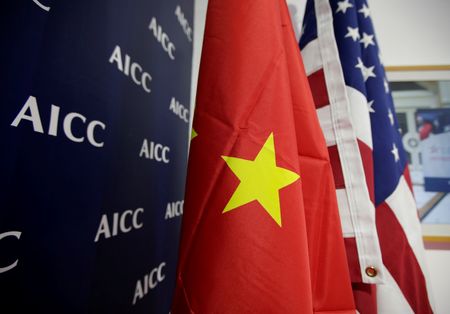By Jeff Mason
WASHINGTON (Reuters) – The United States and five of its allies on Friday condemned the use of trade practices that amount to economic coercion in a joint declaration that did not single out other countries but appeared to be aimed at China.
Australia, Britain, Canada, Japan, and New Zealand jointly released the statement with the United States, emphasizing that “trade-related economic coercion and non-market-oriented policies and practices” threatened the multi-lateral trading system and “harms relations between countries.”
The statement comes after the Group of Seven leaders last month agreed to a new initiative to counter economic coercion and pledged action to ensure that any actors attempting to weaponize economic dependence would fail and face consequences.
The United States, Britain, Japan and Canada are also members of the G7.
The countries expressed concern about “pervasive subsidization,” anti-competitive practices by state-owned enterprises, forced technology transfer, and government interference with corporate decision-making.
Washington has regularly raised such concerns about trade practices by Beijing, and an official from the office of the U.S. Trade Representative, who spoke to reporters about the joint declaration, cited China for imposing a ban on imports from Lithuania after Lithuania allowed Taiwan to open a de facto embassy.
China, which regards the democratically-ruled Taiwan as part of its territory, suspended imports of beef, dairy and beer from Lithuania last year.
In May, Beijing protested the G7’s declarations, including on economic coercion, saying the U.S. was “pushing hard to weave an anti-China net in the Western world.”
In their joint statement on Friday, the U.S. and its five allies also raised concerns about forced labor.
“We are also seriously concerned about the use of forced labour, including state-sponsored forced labour, in global supply chains. All forms of forced labour are gross abuses of human rights, as well as economic issues, and it is a moral imperative to end these practices,” they said.
(Reporting by Jeff Mason; Additional reporting by Dan Whitcomb; Editing by Sonali Paul)

